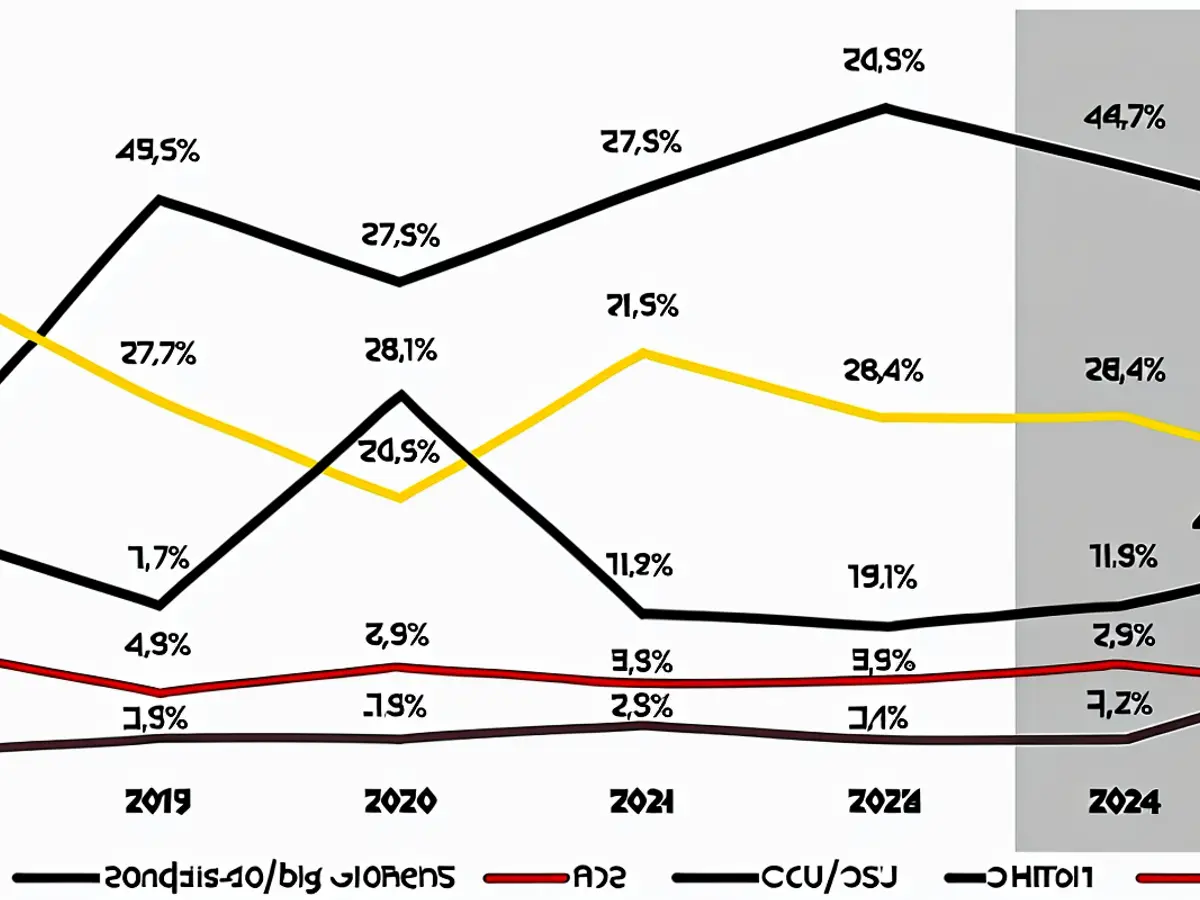- Start-up entrepreneurs' preferred electoral choices
The entrepreneurial landscape in Germany hasn't been smooth sailing: Elevated interest rates and energy costs, a labyrinth of bureaucracy, and an economy on a standstill have dampened the spirits of entrepreneurs in Germany. As per a recent survey by the German Chamber of Industry and Commerce (DIHK), the interest in starting businesses has plummeted to its lowest point since 2010.
Despite this, the survey conducted by the German Startups Association on political leanings of entrepreneurs reveals a stability in their party affiliations. The coalition of SPD, Greens, and FDP collectively losses 11.4% compared to last year. Party choices like AfD and BSW find minimal support among entrepreneurs. The detail breakdown is as follows:
Greens staying on top, Union and Volt surging ahead
With a staggering 41.3%, the Greens hold the top position. They remain the most powerful force among startups in the startup monitor, yet they suffer a loss of 4.9 percentage points compared to the previous year. This is the second consecutive year they've witnessed a decline, and in 2022, they even attained an absolute majority for the first time.
The FDP follows with a 21.4% share, losing 5 percentage points. In comparison to the 2021 federal election year, they lose an even more significant 10.1 percentage points. In 2018, they were more popular than the Greens.
On the other hand, the Union of CDU/CSU stands as the third-strongest force with 15.8%, witnessing a gain of 4 percentage points. The pro-European party Volt occupies the fourth position with a 6.7% share, recording the most significant gain in the startup monitor survey with a 5.2 percentage point increase.
The startup association has been conducting this annual survey in Germany since 2013. It serves as the largest mood test of the sector, although not representative. This summer, more than 1800 entrepreneurs and business leaders took part in the survey.
SPD in the backseat, AfD and BSW outside parliament
In 2024, the SPD, the chancellor's party, is trailing with a mere 5.5%, barely surpassing the 5% threshold. While they experience a slight decline in overall support, they haven't garnered significant support among entrepreneurs in the past.
"The results of the startup survey disappoint me, but I am confident that we as the SPD can still appeal to more entrepreneurs and will strive towards that," remarks Verena Hubertz to Capital. She is the deputy faction leader of the SPD in the Bundestag and previously co-founded the platform Kitchenstories. "Social democracy aligns well with the startup DNA, embodying upward mobility and equal opportunities, irrespective of one's background or education level," remarks Hubertz.
In reality, entrepreneurs tend to be more educated than the general working population. This explanation could also contribute to the meager support for AfD and BSW in the survey. Neither party exceeds the 5% threshold in the startup monitor: AfD, classified as a right-wing extremist suspect, gains a 3% vote, and BSW garners 1.4%.
Populist parties generally thrive where the average age is high, and income and education levels are low, according to a study by the German Institute for Economic Research (DIW). However, the share of academics among entrepreneurs is a staggering 85%, which is exceptionally high. In the general population, only a quarter of employed individuals hold an academic degree, according to the Federal Employment Agency.
Financing and Immigration: Priority issues for Start-ups
Regardless of political affiliation, parties often address the issues that are politically relevant for startups. Topics like financing, innovation, "skilled immigration, social openness, and sustainability" are part of their agendas, which is reflected in voting behavior.
AfD and BSW are particularly popular in eastern German states. However, the Start-up Detector database shows that the most startups were initiated in Berlin, North Rhine-Westphalia, and Bavaria. Mecklenburg-Vorpommern ranks the lowest, followed by Thuringia and Saxony-Anhalt.
The DIHK survey highlights that few people across the country are motivated to start a business. Interests have plummeted to their lowest point since at least 2010. The association attributes this decline to substantially increased operating costs and the tangled web of bureaucratic regulations that stifles the entrepreneurial spirit.
The founding location of Germany continually ranks worse in the survey, with an average grade of 3.6. Seven out of ten respondents advocated for faster and simpler regulations. Six out of ten demanded a simpler tax system, and according to the DIHK, there were also calls for better access to public funding and lower energy prices.
Although the interest in starting businesses has decreased significantly in Germany due to various challenges, a start-up focused on technology and innovation might still see potential in the country's robust academic talent pool and supportive policies for certain sectors. In the annual survey conducted by the startup association, several political parties, such as the Greens, FDP, Union of CDU/CSU, and Volt, have gained or maintained considerable support among entrepreneurs, reflecting their focus on issues like financing, innovation, and skilled immigration.









